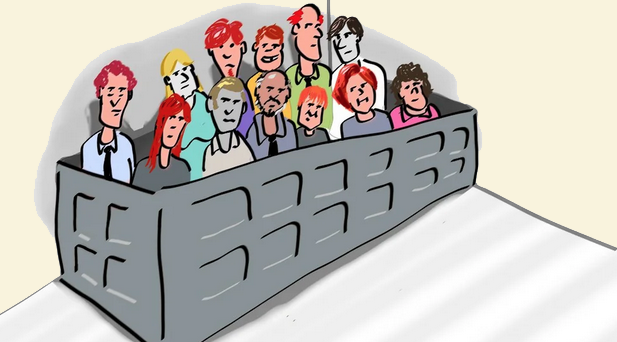— from San Juan County Communications —
As your councilmember and neighbor, I have been asked several questions about the Supreme Court case the county was involved in last December. I decided to write this to clarify the court’s decision. –Bill Watson, San Juan County Councilmember District #1
The Supreme Court Case
December 12, 2019, the Washington State Supreme Court issued its decision on the case of Edward Kilduff versus San Juan County and Jamie Stephens, San Juan County Council Member and Public Records Officer. The Court ruled on three elements in this case: 1) Can the County require entities who have made public records requests to exhaust the county administrative procedures prior to filing a lawsuit? 2) Did the lower court err when it imposed sanctions on both Kilduff and his attorneys, Nick Powers and Michele Earl-Hubbard, for filing a frivolous suit seeking the removal of Council Member Stephens? and, 3) Is Kilduff entitled to attorney’s fees upon appeal?
The Three Elements of the Supreme Court Decision
The first of the three elements is the administrative procedures. It is important to note how the legislative process works and its impact on the development of local government processes. In 1972, the people of Washington voted affirmatively for Initiative 276 that declared the public’s right to access public documents. In response, the legislature established RCW 42.17 Dispositions, which covered disclosure, campaign financing, lobbying and records. Part of the original initiative passed by the voters required government agencies to establish internal review mechanisms for the most prompt possible review of decisions denying inspection, which were deemed complete in two business days.
In 2005, it became apparent that the RCW 42.17 needed to be updated and was recodified to RCW 42.56 Public Records Act. As often is the case, the legislature will pass laws that may not be very specific or provide guidance for implementation or administration. The Public Records Act gave state and local agencies authority to adopt rules, consistent with the Act. To implement the law, learned individuals in the State Attorney General’s Office established internal review procedures for the AG’s office that in the event that a person objects to a denial of a public records request the AG’s office gets a 48-hour opportunity to respond and/or correct before the administrative procedures are exhausted. The AG’s procedures can be found in WAC 44-06-120. San Juan County adopted essentially these same AG procedures on May 11, 2005 with Ordinance 6-2005, with the intent to ensure the county had the same 48 hour opportunity to deliver all the records it has unless it was legally restricted from doing so. Dozens of other municipalities also have adopted similar procedures that are consistent with the AG’s administrative procedures. San Juan County’s procedures received minor updates on November 2, 2015 (Ord. 9-2015) and on October 24, 2017 (Ord. 14-2017).
As is often the case with laws that may not be as specific as intended or have potentially conflicting provisions, it falls to the courts to rule in response to lawsuits on both the intent of the laws and the systems municipalities enact to manage within them. Such was the case with Kilduff v. San Juan County. While the court recognized the burden this decision places on local government, the Court noted that the Public Records Act does not include provisions requiring requesters to use the internal administrative review mechanisms set forth in San Juan County’s rules prior to filing a lawsuit. This not only affects San Juan County, but also the State Attorney General’s Office and the dozens of other municipalities. San Juan County intends to comply with the Court’s decision. If the state legislature feels the court’s decision is unduly burdensome, it is up to them to revise the law.
The second of the three elements deals with the sanctions the trial court imposed on Kilduff and his attorneys for bringing a quo warranto action against council member Stephens. The trial court found this action frivolous and imposed a sanction on both Kilduff and his attorneys, Nick Powers and Michele Earl-Hubbard. The Supreme Court agreed that the quo warranto action attempting to remove council member Stephens from office was properly dismissed, but noted that to impose a fine, all actions within the Kilduff claim must be considered frivolous. Since that was not the case with the administrative procedures portion of the case, the Supreme Court reversed the lower court regarding sanctions, but upheld the dismissal of the action seeking to oust Council Member Stephens.
The third element regards payment of attorney’s fees. Because the merits of Kilduff’s public records claim have not yet been resolved, the Supreme Court sent the issue back to the trial court to determine.
The Outcome – What’s Next?
To quote the Supreme Court, “We therefore reverse in part, affirm in part, and remand to the trial court.” On remand, the Skagit County Superior Court will now decide the merits of the Public Records Act claim.
**If you are reading theOrcasonian for free, thank your fellow islanders. If you would like to support theOrcasonian CLICK HERE to set your modestly-priced, voluntary subscription. Otherwise, no worries; we’re happy to share with you.**








As someone who spent many years working on behalf of the public to ensure that state and local governments complied with the public-records act, and its companion public-meetings act, I would like to add to the county’s spin on the Kilduff case.
Ever since voters established the principle, in law, that “our representative form of government is founded on the belief that those entrusted with the offices of government have nothing to fear from public disclosure,” those same public officials have regularly tried to limit disclosure. The county’s attempt in this case (which it tries to lay off on an action by a Republican state attorney general) is what the state Supreme Court unanimously (I repeat: unanimously) rejected in the Kilduff case.
It is little surprise that it was a case from San Juan County that finally removed this unlawful barrier to access to records. Under Randy Gaylord, the county has a long track record of problems administering the state’s public-access laws, usually in an effort to cover-up, as in this case, egregious government malfeasance. I have found that the people on the front line of administering the public-records law, do so with integrity. Where that has broken down has been above them, especially in the prosecuting attorney’s office.
County residents should be asking ourselves why the county has not provided Kilduff the records he’s requested, and why so much county money is regularly expended to try to justify denial of access.. It clearly is not to protect the legitimate privacy interest of citizens who happen to be named in records; there are plenty of exemptions that allow that. It is rather to try to hide their own malfeasance from public knowledge and thereby avoid accountability.
Enough is enough. The county should admit its error in this case, provide Kilduff the requested public records, pay his attorney fees and quit wasting taxpayer money trying to hide government malfeasance.
I don’t understand any of the legalese presented here, although I tried to read this several times and grasp what’s being said: nor do I understand Alex McLeod’s comment – other than serious accusations of government malfeasance.
But I did follow the intense attempt at character assassination of Randy Gaylord and County Council by Nick Power; its ugliness was repulsive; we’re used to “cleaner” campaigns here.
And I saw that these same actors repeatedly show up time and again (Kilduff (Trojan Heron) /Nick Power/Glen Morgan, et al) to pontificate against Friends, the Land Bank, the SMP, “unreasonable” land use laws, etc – and they seem to be out for blood. This much I understand.
Shouldn’t the “status report” describe the release of the public records in question, after YEARS?
“The AG’s procedures can be found in WAC 44-06-120. San Juan County adopted essentially these same AG procedures on May 11, 2005 with Ordinance 6-2005, with the intent to ensure the county had the same 48 hour opportunity to deliver all the records it has unless it was legally restricted from doing so”.
What legally restricted the sharing of the requested documents in a timely manner? Seriously, that is the only thing I’d like to have clarified. The possible list is fairly short.
Right or wrong, the county’s legal representatives have for a very long time served as a barricade. Precisely the opposite of the objective made possible through public records and transparency. This was quite well explained to the public during the last debates for prosecuting attorney. The first priority is to defend and protect the actions and the administration of our county, however it goes down. There is no public interest served, accepting The interests as they are determined to be worthy via the office of the prosecutor, such as the property rights and privacy rights that have an affect on county assets and activities. In accordance with that purpose they are doing a hell of a job. Sadly however the public is not served. So while the rights and privacy of joe public rapidly diminish, the crimes and misdemeanors of our governments expand equally, and opposite. I don’t know maybe its time we adopt a form of legal representation for the people? Even our elected council members abide by the will of that same office. Its odd though, because I believe the council is in a constant state of conflict with that statement of purpose which is to represent the people. Hmmmmmm/ I think maybe we need a new office, that of transparency, where no elected or otherwise entity of county government has authority. A database open to the public where clear view is avail into not the actions not of the public, but the administration, in its entirety.